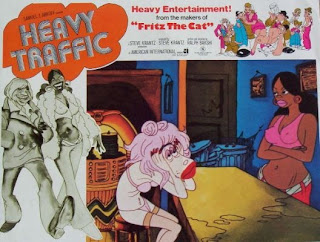While it may be easy to
miss the serious side to "American Graffiti," the same cannot be said
for "Heavy Traffic." After viewing Ralph Bakshi's largely animated
release, I was disturbed. It was if the gates of hell were opened wide. Vincent
Canby summarized the film as:
American graffiti of a very high
and unusual order, a tale of a young New York City pilgrim named Michael,
half-Italian, half- Jewish, ever innocent, and his progress tough a metaphor
that is nowhere as dreary as it sounds: the pinball machine called Life. It is
a liberating, arrogant sort of movie, crude, tough, vulgar, full of insult and
wit, and an awareness of the impermanence of all things.
Like "American Graffiti, "Heavy Traffic was another
low budget film. Conflicts between
film's investors and Bakshi caused a final car chase scene to be dropped, and
one wonders what closing statement is missing. Yet what remained included a
scene featuring Chuck Berry's song "Maybelline" and Detroit "Iron"
disemboweled and disintegrated. It is a picture of automotive chaos contained
within a much larger chaotic view that is prophetic concerning what lays around
the corner in terms of American life.
Traditional moral values, relationships, standards, and material culture
was in rapid flux, to be challenged by new forms that were largely
unanticipated by even careful contemporary observers only a few years before.
While impermanence has always been a part of the American
automobile industry and American life, the rapidity of that change after 1973
coupled with associated structural transitions was unprecedented. And although
oil shocks I and II were major contributors to the dramatic rise of the
Japanese industry and the decline of the Detroit Three, they were two causal
factors, albeit important ones, among a host of other significant forces acting
synergistically at the time. The categorization and explication of those forces
are topics for a major scholarly monograph, and beyond the scope of a twenty
minute introductory talk. But certainly one reason why the automobile industry
went off the tracks was due to federal government policies that often were at
odds with one another and the average American consumer. And that is where I will start my next study,
although I plan to go much beyond that single topic.






No comments:
Post a Comment